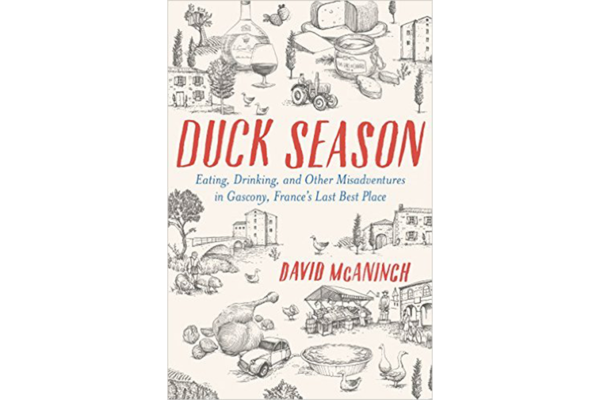Duck Season en France

By Jackson Holahan
When most Americans conjure up dramatic European vacations, images of the Louvre, the canals of Venice, and the ruins of Rome come to mind. Not so for David McAninch, a frequent food and travel writer and the features editor at Chicago Magazine. He had other plans when he decamped, along with his wife and six-year-old daughter, to Gascony, a province in southwest France best known as the home of Bordeaux. McAninch’s yearning for the path less-travelled would not lead him to Bordeaux, however. He settled in a mill house, bifurcated by a meandering stream, in a small town in the Gers, the most rural of France’s 100-plus départements, where ducks outnumber people 20 to one.
Like a culinary Kerouac, McAninch’s spiritual quest is driven by a keen desire to understand Gascony’s places, people, and traditions by covering as much ground, both physical and cultural, as possible in eight months. His adventures and misadventures are chronicled in "Duck Season," which is equal parts travelogue and personal diary.
McAninch sets out to solve the age-old conundrum of the traveler: how to have a unique, authentic experience in a foreign land in a finite period. Short of relocating to Gascony permanently, he does as fine a job as nearly anyone could in eight months. He encounters Nadine Cauzette, a widow from the neighboring town who serves as a constant and willing mentor for every hallmark Gascon dish (duck confit, poule au pot, and pigeon ragout) that he seeks to cook, often successfully. Les Esbouhats, a local fraternal cooking (and drinking) club, similarly welcome McAninch into the fold, which results in many a late night, often punctuated by fine local wine. This group acts as a social nexus within the town, and its members readily include McAninch in their many Gascon traditions.
Amandine, the most popular cheese merchant at the local market, obliges McAninch’s entreaty to lead him into the Pyrenees for an overnight at the mountain cabin of Marcel, a Basque cheesemaker who tends to his summer sheep flock some 8,000 feet above sea level. This harrowing journey involves a nighttime all-terrain vehicle ride on the lip of a cliff, as well as the requisite amount of cheese, ham, bread, and eggs that such a trek merits.
McAninch writes honestly and joyfully about his myriad encounters with the true Gascon culture throughout. The fact that he speaks French fluently offers him an essential advantage, but McAninch’s true charm is his ability to inject himself headlong into the quotidian happenings of a rural town.
We all should be so lucky to have a bit of the fearless traveler within us. Oftentimes, work commitments and other practical considerations render the choice to relocate one’s family a bit beyond reach for many. Nonetheless, it is impossible to read "Duck Season" and not consider devising at least one adventurous, authentic excursion. While he chose rural France, McAninch’s writing is steeped in the notion that one need not go far to truly experience a place, its people, and its oddities.
McAninch is well-served by a curiosity, happiness, and lack of pretension that makes it all the easier for those around him to regard him as a local, and less as a stranger. One of the crowning achievements of his time in Gascony is when McAninch throws a winning dinner party, noting that, “to do so in a far-flung place where you have moved with your family at considerable effort and expense, and with more than a little uncertainty as to how the whole thing is going to turn out, feels especially good.”
Hosting a successful dinner party in rural France sounds great, but until you arrive there, look no further than the appendix of "Duck Season," where McAninch shares the recipes for eight Gascon staples. An adventure in your own kitchen can be the best kind.